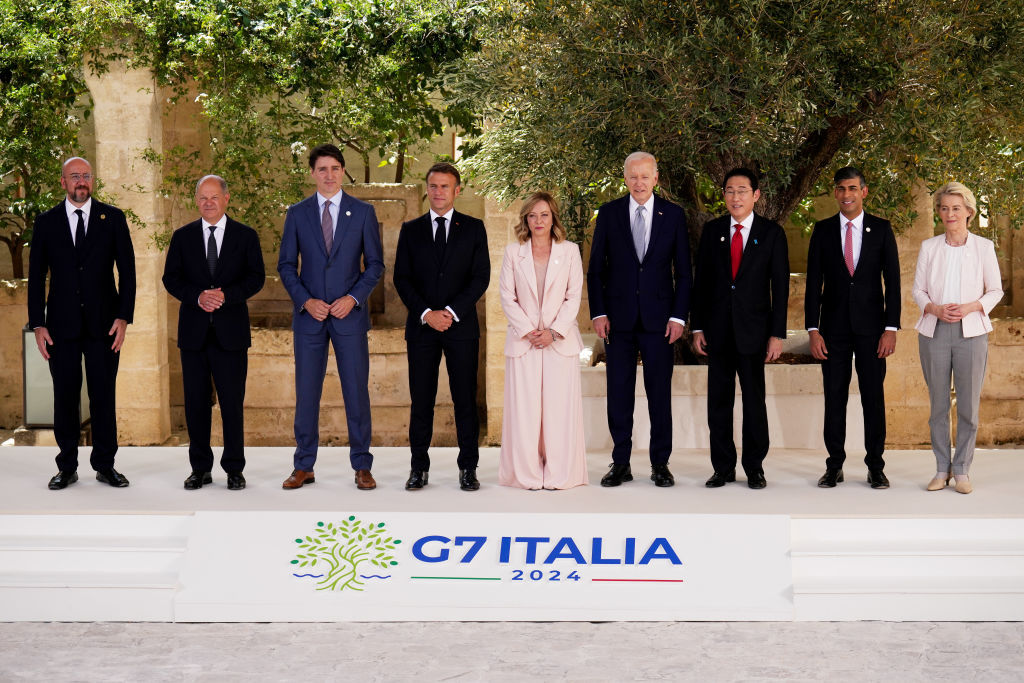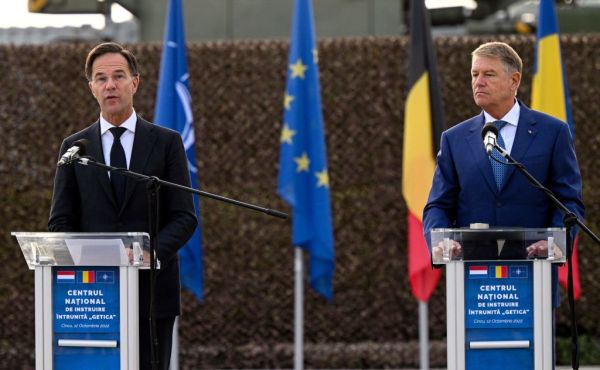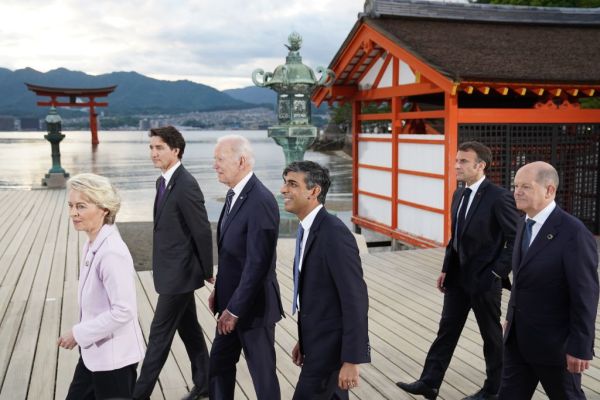Happy Monday! And a belated happy Father’s Day to all the dads out there—we hope your (new favorite) kid got you a Dispatch subscription!
Quick Hits: Today’s Top Stories
- In a 6-3 decision on Friday that saw the six conservative justices in the majority, the Supreme Court struck down a Trump-era ban on bump stocks for firearms. The majority, in an opinion authored by Justice Clarence Thomas, held that the Trump Justice Department had overstepped its authority in instituting a ban on bump stocks which the justices said did not turn rifles into machine guns. “There is a simple remedy for the disparate treatment of bump stocks and machineguns,” Justice Samuel Alito wrote in a brief concurring opinion. “Congress can amend the law—and perhaps would have done so already if ATF had stuck with its earlier interpretation. Now that the situation is clear, Congress can act.”
- In another, 5-4 decision on Friday—in an opinion authored by Justice Samuel Alito and joined by Justices John Roberts, Amy Coney Barrett, Brett Kavanaugh, and Clarence Thomas—the Supreme Court upheld the government’s current requirements for notifying illegal immigrants about their asylum court dates, which can sometimes lack key information. In a third decision on Friday—authored by Justice Ketanji Brown Jackson and joined by Roberts, Alito, Kavanaugh, Sonia Sotomayor, and Elena Kagan—the court denied refunds of bankrupt debtors’ fees for entities the court had previously ruled were overcharged and concluded that equal fees going forward was sufficient remedy.
- CNN officially agreed to terms with both the Biden and Trump campaigns on rules that will govern the presidential debate set for June 27. The event will lack an in-person studio audience, and candidates’ microphones will be muted when they are not speaking during the 90-minute affair. Though CNN said it’s “not impossible,” Robert F. Kennedy Jr. seems unlikely to meet the threshold for participation, which requires candidates to be on the ballot in enough states to theoretically be able to secure the 270 electoral votes required to win the election.
- Leaders of the world’s advanced democracies—the United States, Japan, France, Canada, Italy, Germany, and the United Kingdom—met in Puglia, Italy, over the weekend for the annual Group of Seven (G7) summit. In addition to agreeing to back a $50 billion loan for Ukraine using the profits generated by frozen Russian assets, G7 leaders, including President Joe Biden, condemned China’s support of “Russia’s war machine” in the final communiqué from the meeting—which mentioned China, not present, almost 30 times.
- Nearly 80 countries attending a peace conference for Ukraine in Switzerland over the weekend affirmed their belief that Ukraine’s “territorial integrity” should be the basis of any peace agreement, meaning Russia—which was not invited—should not gain land in an eventual truce to end the war. Several nations—including Mexico, India, Saudi Arabia, Thailand, South Africa, and the United Arab Emirates—did not sign onto the final communiqué from the two-day meeting. Vice President Kamala Harris represented the U.S. at the summit, where she introduced a $1.5 billion package that included humanitarian aid, money to repair energy infrastructure damaged in Russia’s bombardment, and “civilian security assistance” for Ukrainian border guards and law enforcement.
- The Israel Defense Forces (IDF) announced Sunday that, for an indefinite period of time, it will pause daytime fighting along nearly eight miles of a key aid corridor near Rafah in southern Gaza. The daily stoppage will begin at 8 a.m. local time and last until 7 p.m. to allow aid to travel from Kerem Shalom, an Israeli-controlled border crossing, to the areas of Rafah and Khan Younis. On Friday, the Biden administration imposed sanctions on the Tzav 9 movement, a right-wing Israeli nationalist group that reportedly blocked aid trucks’ access to Gaza. Meanwhile, the IDF said eight Israeli soldiers were killed west of Rafah on Saturday in an apparent mine explosion as they were traveling in an armored vehicle. Outside of standard operating procedure, the carrier contained engineering equipment that detonated when the vehicle hit the mine.
- The Iranian-backed Houthi rebels struck a Greek-flagged ship in the Red Sea using an unmanned vessel that moves on the surface of the water—a so-called “sea drone”—last week, in the first successful deployment of the weapon since the Yemen-based Houthis began attacking commercial ships moving through the busy waterway in November in ostensible protest of the Israel-Hamas war. The crew of the Greek-flagged ship and of a Ukrainian vessel struck by Houthi missiles over the weekend were both forced to abandon ship due to damage sustained to their vessels. U.S. Central Command said it struck several Houthi targets in Yemen last week, as well as destroyed two of the group’s “unmanned surface vessels,” or sea drones.
- Fourteen Jordanians reportedly died from heat and dehydration at Mecca in Saudi Arabia as they participated in the yearly hajj pilgrimage—which started Friday and will continue until Wednesday—to the Islamic holy site. Temperatures at Mecca, where more than 1.8 million Muslims are expected to travel over the next several days, exceeded 110 degrees Fahrenheit over the weekend.
- Russian forces on Sunday shot and killed prisoners at a detention center in the southwestern part of the country, according to Russian state media, after several—including some in prison on terrorism charges—launched a short-lived mutiny at the prison in Rostov-on-Don. The suspects said to be armed with knives reportedly took two prison guards hostage during that stand-off.
- A wildfire northwest of Los Angeles, California, that began Saturday has burned more than 14,000 acres and forced more than 1,200 people to evacuate from a popular outdoor recreation area—making it the state’s largest wildfire yet this year. As of Monday morning, the blaze was just 2 percent contained, according to CalFire, the state firefighting agency, though no homes have yet been damaged.
- Bryson DeChambeau finished six strokes under par at Pinehurst No. 2 on Sunday to narrowly eke out his second U.S. Open victory, defeating Rory McIlroy by one stroke. McIlroy, who hasn’t won a major championship since 2014, missed a two-and-a-half foot putt on the 16th hole to give DeChambeau the lead.
Domestic Concerns Loom Over G7 Meeting

As the summer travel season begins, millions of tourists will flock to Italy for vacation, drawn to the rolling hills of the Italian countryside where vineyards and golden fields stretch to the horizon. World leaders are no different.
The leaders of the Group of Seven (G7) advanced democracies gathered over the weekend for their 50th annual meeting. Their yearly reunion took place in Puglia, Italy—the heel of the Italian peninsula boot—and unlike the tourists visiting the rugged Adriatic coast to leisurely sip macchiatos in centuries-old piazzas, President Joe Biden and his counterparts gathered to discuss some of the world’s biggest problems. Though maybe that’s what you discuss over your macchiatos, too.
Leaders walked away with a set of agreements that were as much about those who weren’t there—namely, Russian President Vladimir Putin and Chinese President Xi Jinping—as those who were. But they also signed onto a plan to use seized Russian assets for Ukraine and looked forward to the threats of artificial intelligence (AI), though the current set of G7 chiefs—many of whom are deeply unpopular domestically—may be out of the hot seat before AI reaches its zenith.
For a group of incredibly powerful people, the G7 lunch table is not exactly where the popular kids sit. Both French President Emmanuel Macron and United Kingdom Prime Minister Rishi Sunak are staring down the barrel of elections in July that—based on current polling—seem likely to go extremely poorly for their respective parties. Like Macron, German Chancellor Olaf Scholz was embarrassed in European Union parliamentary elections earlier this month when his Social Democrats put up their worst nationwide showing in a century, despite—or perhaps because of —Scholz’s vigorous campaigning on behalf of his party’s candidates. The North American contingent—Biden and Canadian Prime Minister Justin Trudeau—is also in bad shape: Both men’s approval ratings are deeply underwater, and Biden has his own election to worry about. Not to miss out on the fun, Japanese Prime Minister Fumio Kishida’s approval ratings hit a record-low this spring.
Unique in the group is Italian Prime Minister Giorgia Meloni, and not just for being the only female leader of the G7. Her party, the right-wing Brothers of Italy, cleaned up in EU parliamentary elections and will be the belle of the ball as parties to her right and left court her European parliamentarians for support. Likewise, she was the kingmaker of the G7 as host—putting Indian Prime Minister Narendra Modi front-and-center despite his complicated relationships with Trudeau and, to a lesser extent, Biden, and making migration from Africa a key issue in the final communiqué.
But if Meloni is riding high, using her recent boost to lobby for her foreign policy priorities, the other, embattled leaders were likely hoping to exert some control over an area where they have more room to maneuver than they do on complicated domestic questions—and perhaps project some statesmen-like gravitas back home. “From [Biden’s] perspective, the real work to be done here is work that is going to put the United States in the best possible position to protect our interests and reflect our values,” National Security Adviser Jake Sullivan said Thursday as the summit was kicking off.
Former President Donald Trump—Biden’s election opponent whose confrontational style and predilection for tariffs often put G7 leaders on edge—loomed over the proceedings as well, even if he was across an ocean. “Every day subsequent to this summit, [Biden’s] goal is going to be to do as much as possible to reinforce the idea that the United States is best served if we are closely aligned with our democratic allies and partners,” Sullivan added. “That we are more likely to accomplish our objectives, more likely to protect the interests of our workers and businesses, more likely to produce security and stability when we are aligned, as opposed to in conflict, with the leading democracies of the world.”
That pretty sentiment wasn’t all-encompassing, though. Italy’s Meloni reportedly requested that the final communiqué from the summit not mention “abortion” or “reproductive rights”—an ask that perturbed Macron and Biden, who reportedly told staff he would not sign the document withouts its inclusion. In the end, those words were not explicitly included in the final statement, but the leaders did “reiterate [their] commitments in the Hiroshima Leaders’ Communiqué,” which includes “addressing access to safe and legal abortion and post-abortion care.”
The G7 countries have spent the last two years—since Russia’s invasion of Ukraine and the concomitant sanctions they levied against Moscow—in lockstep over their condemnation of Putin’s actions. This year, they expanded their condemnation to include China, which they accused in their final statement of “materially support[ing] Russia’s war machine.” The document also suggests the group’s leaders are ready to impose sanctions on China to punish the country for sending dual-use technologies to Russia and on Chinese companies for propping up the Russian economy by facilitating sanctions evasion.
Despite their unanimity on that score, G7 countries have spent the last two years haggling over what to do with the almost $300 billion in sovereign Russian assets sitting frozen in banks in their countries. This year, they finally reached a decision.
As we reported last month, EU leaders were concerned about the precedent created by seizing that cash outright, and opted instead to keep it frozen—inaccessible and entirely disconnected from the Russian government and its leaders. Under the EU’s recently-brokered deal, Ukraine would not receive that money per se, but rather the profits from those frozen assets—almost like capital gains or dividends from investments in the stock market. That cash, estimated to be between $3.24 and $5.4 billion every year, would be sent to Kyiv.
While annualized gains work just fine for our 401Ks, Ukraine needs money for its war effort now, not later. So G7 leaders made a preliminary agreement to issue a $50 billion loan to Ukraine—a loan Ukraine itself will not be on the hook for, but one that will instead be repaid from windfall profits from the frozen Russian assets for at least ten years or until Russia pays reparations, whichever comes first. The funds could be used for a variety of ends—including non-military purposes, which would allow Japan, constitutionally barred from providing lethal aid, to contribute. “As Russia continues to move to a permanent war footing and Ukraine faces a sizable future funding gap, Mr. Putin is betting that he can wait out the [G7] coalition until Ukraine runs out of money and bullets,” U.S. Treasury Secretary Janet Yellen wrote in the New York Times on Friday. “Our proposal would send a clear message to Mr. Putin that we are in it for the long haul.”
Biden and Ukrainian President Volodymyr Zelensky—who was doing shuttle diplomacy from his own peace summit in Switzerland to the G7, where he was an invited guest—announced a ten-year, U.S.-Ukraine bilateral security agreement. The deal aims to advance weapons assistance and intelligence sharing between the two countries, and Zelensky suggested the deal could be viewed as a bridge to Ukraine’s eventual NATO membership, which would require Ukraine’s military to be interoperable with those of the current NATO allies. “Through this agreement, the United States will work with our partners to strengthen Ukraine’s ability to defend itself now and to deter future aggression,” the White House said in a statement Friday. “By doing so, we will bolster Ukraine’s security, which is central to European security and to American security.”
Both proposals—one which frontloads cash to Ukraine and another which has a long time horizon—seem to have been crafted with an eye to the possibility that Trump emerges victorious in the November general election. The former president has been inconsistently supportive of Ukraine aid in the past and on Saturday seemed to criticize Zelensky for his repeated requests for funds. Trump could undo the security pact if elected.
But foreign threats did not monopolize the conference. The G7 leaders also turned their attention to the future of tech, with perhaps an unlikely messenger for concerns over AI: the 87-year-old pontifex. But Pope Francis—the first pope to address a G7 gathering—knows about that which he speaks. Last year, he was the subject of a viral, AI-generated image showing him donning a white Balenciaga puffer jacket with a bejeweled cross. In addition to his regular duties, His Holiness has become the world’s ethicist around the appropriate use of AI, and dedicated this year’s New Year’s message to the use of AI as a peacekeeping force.
“We cannot doubt that the advent of artificial intelligence represents a true cognitive-industrial revolution, which will contribute to the creation of a new social system characterized by complex epochal transformations,” the Pope said to world leaders Friday. “Yet at the same time, it could bring with it a greater injustice between advanced and developing nations or between dominant and oppressed social classes.”
But at least a couple of the world leaders he addressed last week may not be in a position to do anything about global governance on AI, though Biden is surely hoping his buddy Scholz’s prediction is correct—even if his track record isn’t so great. “I think it is very likely,” the German chancellor said Saturday, “that the current president could win the election.”
Worth Your Time
- Is war with China inevitable? “Like Germany and Britain before World War I, China and the United States seem to be locked in a downward spiral, one that may end in disaster for both countries and for the world at large,” Norwegian historian Odd Arne Westad wrote in Foreign Affairs. “Similar to the situation a century ago, profound structural factors fuel the antagonism. Economic competition, geopolitical fears, and deep mistrust work to make conflict more likely. But structure is not destiny. The decisions that leaders make can prevent war and better manage the tensions that invariably rise from great-power competition. As with Germany and Britain, structural forces may push events to a head, but it takes human avarice and ineptitude on a colossal scale for disaster to ensue. Likewise, sound judgment and competence can prevent the worst-case scenarios.”
- For the Israeli newspaper Haaretz, Lee Yaron reported on the shocking results of Columbia University’s antisemitism task force, launched late last year. “One professor encountering a Jewish-sounding surname while reading names before an exam asked the student to explain their views on the Israeli government’s actions in Gaza,” Yaron wrote. “Another told their class to avoid reading mainstream media, declaring that ‘it is owned by Jews.’ A third revealed a student’s complaint about an offensive comment regarding Jews by publicly displaying their email to fellow students. Several times, professors encouraged students to participate in pro-Palestinian protests or the Gaza Solidarity Encampment for extra credit, or conducted classes at protest sites. Other incidents included students wearing Jewish symbols having them torn from their person. Some were pushed out of student clubs they had been part of because they did not want to participate in group actions and statements against Israel’s right to exist. … Haaretz has interviewed several members of the task force, who say they have documented hundreds of cases of Jewish students feeling discriminated against.”
Presented Without Comment
Former President Donald Trump, on Truth Social:
HAPPY FATHER’S DAY TO ALL, INCLUDING THE RADICAL LEFT DEGENERATES THAT ARE RAPIDLY BRINGING THE UNITED STATES OF AMERICA INTO THIRD WORLD NATION STATUS WITH THEIR MANY ATTEMPTS AT TRYING TO INFLUENCE OUR SACRED COURT SYSTEM INTO BREAKING TO THEIR VERY SICK AND DANGEROUS WILL. WE NEED STRENGTH AND LOYALTY TO OUR COUNTRY, AND ITS WONDERFUL CONSTITUTION. EVERYTHING WILL BE ON FULL DISPLAY COME NOVEMBER 5TH, 2024 – THE MOST IMPORTANT DAY IN THE HISTORY OF OUR COUNTRY. MAKE AMERICA GREAT AGAIN!!!
Also Presented Without Comment
ESPN: Bryson Dechambeau’s Triumph and Rory McIlroy’s Heartbreak Determined by Inches at the U.S. Open
“This year, McIlroy has had 496 putts inside 3 feet. He had made all of them.”
Also Also Presented Without Comment
Catholic News Agency: Pope Francis Gets Laughs at Meeting With Big-Name Comedians
Jim Gaffigan came to the Vatican with his wife, Jeannie, and 11- and 12-year-old sons, Patrick and Michael, who asked the pope to bless their rosaries.
“I’m going to brag about meeting the pope. That’s so cool,” Michael told CNA.
“And now you have to become a priest!” Gaffigan said to Patrick after he had received a pat on the cheek and candy from Pope Francis.
In the Zeitgeist
The King of Country, George Strait, broke the U.S. record for a ticketed concert on Saturday, playing to 110,905 fans at Texas A&M’s Kyle Field in College Station, Texas. Though the man has been married since 1971, we have to believe that in a crowd that large—and in Texas of all places—there must have been a handful of his exes in the audience.
Toeing the Company Line
- In the newsletters: The Dispatch Politics crew covered GOP Rep. Tom Cole’s contentious primary in Oklahoma, Nick explored why (🔒) young and old people are no longer backing their typical partisan horses, Jonah argued Veep is the most realistic D.C.-based show, and Chris updated (🔒) his 2024 U.S. Senate race ratings.
- On the podcasts: Sarah and David discussed the Supreme Court’s latest decisions on Advisory Opinions while Jonah ruminated on Dispatch cake-gate and Donald Trump’s return to the Capitol. On today’s episode of The Dispatch Podcast, Jamie interviews Steve Ballmer, the former head of Microsoft, about his USAFacts initiative.
- On the site over the weekend: Giancarlo Sopo reviewed Ezra—a new “heartwarming father-son road trip adventure”—and O. Alan Noble meditated on the West’s crisis of meaning.
- On the site today: Yuval Levin lays out how incoming C-SPAN CEO Sam Feist can begin to undo the damage cameras have done to Congress, Charlotte reports on the Palestine Chronicle’s ties to Hamas and Iran, and John sits down with Larry Hogan to discuss why he’s running for U.S. Senate.
Let Us Know
How did you celebrate Father’s Day this weekend?











Please note that we at The Dispatch hold ourselves, our work, and our commenters to a higher standard than other places on the internet. We welcome comments that foster genuine debate or discussion—including comments critical of us or our work—but responses that include ad hominem attacks on fellow Dispatch members or are intended to stoke fear and anger may be moderated.
With your membership, you only have the ability to comment on The Morning Dispatch articles. Consider upgrading to join the conversation everywhere.